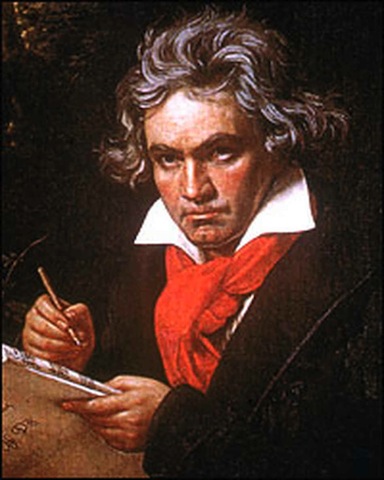http://www.youtube.com/watch?v=f2ZNNJbA2R0
‘The Pulse of An Irishman,’ arranged by Ludwig Van Beethoven featuring Robert White (Irish tenor), Yo-Yo Ma (cello) Ani Kavafian (violin), Samuel Sanders (piano). Posted at YouTube by christomacin.
The text:
The pulse of an Irishman ever beats quicker
when war is the story, or love is the theme;
and place him where bullets fly thicker
and thicker you’ll find him all cowardice scorning.
And tho’ a bakk should main poor Darby light
at the heart he rallies on “Fortune is cruel.
but Norah, my jewel, is kind, and with smilling,
all sorrow bequiling,
shall bid from our cabin all care to be gone,
and how they will jig it, and tug at the spigot,
on Patrick’s day in the mornin’.”
O blest be the land in the wide western waters,
sweet Erin, lov’d Erin, the pride of my song;
still brave be her sons,
and still fair be the daughters
thy meads and thy mountains adorning!
And tho’ the the eastern sun seems tardy,
tho’ the pure light of knowledge slow,
night and delusion, and darking confusion
like mists from the river shall vanish for ever
and true Irish hearts with warm loyalty glow:
and pround exaltation burst forth from the nation on Patrick’s day in the monrin’.
Beethoven, ‘The British Light Dragoons,’ Irish Songs, WoO 153, No. 3. Posted at YouTube by Archishman Ghosh.
Beethoven’s Irish Songs
Numerically, what did Beethoven write most of?
Settings of Irish songs, for voice (or voices), violin, cello, and piano is the surprising answer: seventy-two of them. They were commissioned by the Scottish publisher George Thomson, at the instigation of Robert Burns who promised to provide the lyrics. Burns had already sent Thomson lyrics for Scottish airs, to be arranged by Haydn and the Czech composer Kozeluch for the same forces, and indeed these were to provide some of Kozeluch’s greatest hits.
Burns’s death in 1796, at the age of thirty-seven, scotched his Beethoven plan, and Thomson tried to replace him with the young Thomas Moore as lyricist. Moore hesitated for two years and then decided to do his own publication; his enormously successful Irish Melodies and Popular National Airs came out in London between 1808 and 1834.
Beethoven’s settings, made in the first decade of the nineteenth century, were (not all, but most of them) published in London and Edinburgh in 1814/16, but they never approached the popularity of Moore’s. One likely reason for their obscurity is the fact that Thomson had to make do with second- and third-rate poets to come up with the words. You seldom hear them performed; I have only heard of one performance of any of them. They obviously fired Ludwig’s imagination, though; they are lively and full of character, both Irish and Beethovenian, and a few contain snatches that reappear in the Seventh Symphony (written 1811/12). –excerpt from Recumbentman’s Blog, “Beethoven’s Irish Songs.” Recumbentman is Dublin, Ireland’s Andrew Robinson, who prepares music scores for publication and performance using Sibelius software. He also works under the pseudonym Smoot Scoring.


